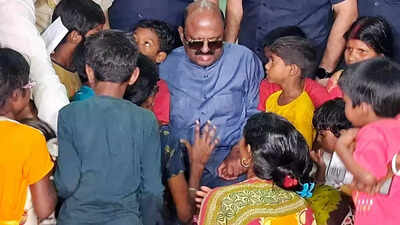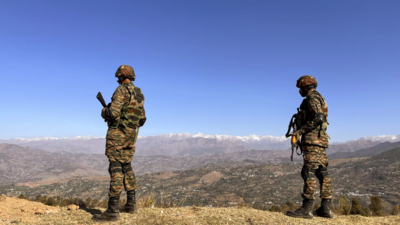Murshidabad riots: Bengal guv flags ‘radicalisation’ threat in report to MHA | India News

NEW DELHI: West Bengal governor CV Ananda Bose on Sunday submitted to the home ministry a detailed report linked to the recent riots in the Murshidabad district, warning that the “twin spectre of radicalisation and militancy” presents a grave challenge in the state.
The violence, which erupted during protests against the Waqf (Amendment) Act, claimed the lives of at least three individuals, including a man and his son, and left many others injured.
“The twin spectre of radicalisation and militancy poses a serious challenge for West Bengal, especially in two of the several districts sharing an international border with Bangladesh, viz., Murshidabad and Malda. In both these districts, there is an adverse demographic composition with Hindus being minorities. Another district, viz, Uttar Dinajpur, has a plurality,” the governor mentioned in the report, according to news agency PTI.
He noted that the violence appeared to be “premeditated” and alleged that the state government was “aware of the imminent build-up of a threat to law and order in Murshidabad”.
“As the Notification of the Waqf (Amendment) Act, 2025 was issued on 08.04.2025, conflagration unfolded in Murshidabad district that spiralled out of control and continued for several days. On 08.04.2025, the state government promulgated a temporary suspension order of the internet…Thus, the state government was aware of the imminent build-up of a threat to law and order in Murshidabad,” the report said.
Bose highlighted administrative shortcomings during the unrest. “Clearly, the sequence of events that unfolded shows the woeful lack of coordination among administration and law enforcement agencies that were either too feeble to rise up to the challenge or were reluctant to do so,” he alleged.
Among the key recommendations in the report, the governor called for a range of measures, such as establishing outposts of central forces in border districts and appointing an inquiry commission under the Commissions of Inquiry Act, 1952.
He also urged the formulation of legislation to empower the Union government to act when state law enforcement fails.
“Formulating an overarching legislation to empower the Union government to maintain law and order when the state machinery fails to act effectively. Appointing a commission of Inquiry under the Commissions of Inquiry Act, 1952, to look into the reported acts of omission and commission as indicated above and to suggest measures to prevent such incidents in future and needless to add, the provisions under Article 356 of the Constitution also remain,” the report mentioned.
While the inclusion of Article 356 in the report drew attention, a government official clarified the governor’s intent. Asked about the reference, the official told PTI, “The governor has not proposed for implementation of Article 356. He meant to say that the provisions of Article 356 of the Constitution are open to the Centre if the situation in the state further deteriorates.” Article 356 allows the imposition of President’s Rule in a state.
The governor further stated, “To go by the history of political violence that the state is prone to and from the spillover effect that the Murshidabad violence had over other districts in the state, may I suggest that the government of India considers the Constitutional options not only to put a check on the current situation but also to generate confidence of people in the rule of law.”
He also voiced concern over the growing communal polarisation in the region. “The divisions are so deep that even in the face of escalation of violence, the chief minister’s repeated ‘undertaking’ that she would protect minority interests, and that the Act would not be implemented in the state, have done little to assuage the Muslim community or stem the tide. It is imperative that the rule of law must be firmly established, and the police must prevent violence,” Bose wrote in the report.
He warned of the possibility that the unrest in Murshidabad could spread to other parts of the state and insisted that the central government consider “constitutional options to put a check on the current situation besides generating confidence of people in the rule of law”.
As of now, officials from the Trinamool Congress and the state administration have not responded to the assertions made in the governor’s report.





